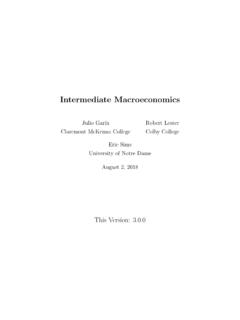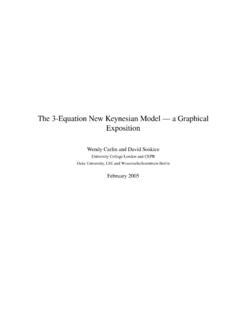Transcription of IMPACT OF FISCAL POLICY ON THE MANUFACTURING …
1 British Journal of Business and Management Research , , , June 2014 ) Research Institute UK (Published by Briti 31 IMPACT OF FISCAL POLICY ON THE MANUFACTURING SECTOR OUTPUT IN NIGERIA: AN ERROR CORRECTION ANALYSIS Eze, Onyekachi Richard Department of Banking and Finance, Ebonyi State University, Nigeria. ABSTRACT: There has been a growing concern on the role of FISCAL POLICY on the output and input of MANUFACTURING industry in Nigeria, despite the fact that the government had embarked on several policies aimed at improving the growth of Nigerian economy through the contribution of MANUFACTURING industry to the economy and capacity utilization of the sector. The aim of this study is to examine the IMPACT of FISCAL POLICY on the MANUFACTURING sector output in Nigeria.
2 Empirical evidence from the developed and developing economies has shown that FISCAL and monetary policies have the capacity to influence the entire economy if it is well managed. An ex-post facto design (quantitative research design) was used to carry out this study. The results of the study indicate that government expenditure significantly affect MANUFACTURING sector output based on the magnitude and the level of significance of the coefficient and p-value and there is a long-run relationship between FISCAL POLICY and MANUFACTURING sector output. The implication of this finding is that if government did not increase public expenditure and its implementation, Nigerian MANUFACTURING sector output will not generate a corresponding increase in the growth of Nigerian economy.
3 It is the recommendation of researcher that the expansionary FISCAL policies should be encouraged as they play vital role for the growth of the MANUFACTURING sector output in Nigeria; that FISCAL POLICY should be given more priority attention towards the MANUFACTURING sector by increasing the level of budget implementation, which will enhance aggregate spending in the economy; and consistent government implementation will contribute to the increase performance of MANUFACTURING sector. KEYWORDS: MANUFACTURING sector, Government expenditure, Government tax revenue, Output, Capacity utilization, Error correction model, Co-integration. INTRODUCTION Background of the Study Recently, government policies began to show more concern on the management and improvement of the economy.
4 Government over the years have embarked on various macroeconomic POLICY options to grow the economy in terms of growth and development and the POLICY option employed is that of FISCAL POLICY (Peter and Simeon, 2011). FISCAL POLICY is the use of government revenue collection (taxation) and expenditure (spending) to influence the economy. The two main instruments of FISCAL POLICY are government taxation and government expenditure. It can also be seen as government spending policies that influence macroeconomic conditions. These policies affect tax rates, interest rates and government spending, in an effort to control the economy. British Journal of Business and Management Research , , , June 2014 ) Research Institute UK (Published by Briti 32 The role of FISCAL POLICY on the output and capacity utilization of MANUFACTURING industry in Nigeria has been a growing concern, despite the fact that the government had embarked on several policies aimed at improving the growth of the Nigerian economy through the contribution of MANUFACTURING industry to the economy and capacity utilization of the sector (Adebayo, 2010; Peter and Simeon, 2011 and Loto, 2012).
5 Libanio (2006) through the use of Kaldor s first law defined MANUFACTURING sector as the engine of growth of the economy. MANUFACTURING sector refers to those industries which are involved in the MANUFACTURING and processing of items and indulge or give free rein in either the creation of new commodities or in value addition (Adebayo, 2010). To Dickson (2010), MANUFACTURING sector accounts for a significant share of the industrial sector in developed countries. The final products can either serve as finished goods for sale to customers or as intermediate goods used in the production process. Loto, (2012) refers to MANUFACTURING sector as an avenue for increasing productivity in relation to import replacement and export expansion, creating foreign exchange earning capacity, raising employment and per capita income which causes unrepeatable consumption pattern.
6 Mbelede (2012) opined that MANUFACTURING sector is involved in the process of adding value to raw materials by turning them into products. Thus, MANUFACTURING industries is the key variable in an economy and motivates conversion of raw material into finished goods. In the work of Charles (2012), MANUFACTURING industries creates employment which helps to boost agriculture and diversify the economy on the process of helping the nation to increase its foreign exchange earnings. MANUFACTURING industries came into being with the occurrence of technological and socio-economic transformations in the Western countries in the 18th-19th centuries. This period was widely known as industrial revolution. It all began in Britain and replaced the labour intensive textile production with mechanization and use of fuels.
7 MANUFACTURING sector are categorized into engineering sector, construction sector, electronics sector, chemical sector, energy sector, textile sector, food and beverage sector, metal-working sector, plastic sector, transport and telecommunication sector (CBN, 2012). In recent times, some MANUFACTURING industries in Nigeria have been characterized by declining productivity rate, by extension employment generation, which is caused largely by inadequate electricity supply, smuggling of foreign products into the country, trade liberalisation, globalisation, high exchange rate, and low government expenditure. Therefore, the slow performance of MANUFACTURING sector in Nigeria is mainly due to massive importation of finished goods, inadequate financial support and other exogenous variables which has resulted in the reduction in capacity utilization and output of the MANUFACTURING sector of the economy (Tomola, Adebisi and Olawale, 2012).
8 Looking at the MANUFACTURING sector share in the GDP in recent years (1990-2010), it has not been relatively stable. In 1990, it was about while it dropped to in 2010. Also at the same period, the overall MANUFACTURING capacity utilization grew from in 1990 to in 2010 (CBN, 2011) (See Appendix I). This may be attributed to the increase in government expenditure in recent times. Furthermore, in Nigeria, the level of growth in MANUFACTURING sector has been affected negatively because of high interest rate on lending and this high lending rate is responsible for high cost of production in the country s MANUFACTURING sector (Adebiyi, 2001; Adebiyi and Babatope, 2004; Rasheed, 2010). Okafor (2012) further observed that the level of British Journal of Business and Management Research , , , June 2014 ) Research Institute UK (Published by Briti 33 Nigerian MANUFACTURING industries performance will continue to decline because of low implementation of government budget and difficulties in assessing raw materials.
9 These changes in the MANUFACTURING share of the GDP and capacity utilization shows that firms that are efficient can contribute to job creation, technology promotion and as well ensure equitable distribution of economic opportunities and the macroeconomic stability of the country. Based on the nature and importance of the relationship between FISCAL POLICY and MANUFACTURING sector, the study becomes necessary in Nigeria, where output and capacity utilization of MANUFACTURING sector have suffered rapid fluctuations in recent years. Since government desires to increase total spending in the economy with FISCAL POLICY which can either increase its spending or reduce taxes in maintaining MANUFACTURING sector stability, it is therefore the researcher s interest to investigate the IMPACT of FISCAL POLICY on the MANUFACTURING sector of Nigerian economy.
10 Thus, this is the focus of this seminar paper. Statement of the Problem Upon several government policies on the stability of Nigerian economy through MANUFACTURING industry, there have been a lot of challenges facing the growth of Nigerian MANUFACTURING industry as identified by researchers. These challenges include: corruption and ineffective economic policies (Gbosi, 2007); inappropriate and ineffective policies (Anyanwu, 2007); lack of integration of macroeconomic plans and the absence of harmonization and coordination of FISCAL POLICY (Onoh, 2007); gross mismanagement/misappropriations of public funds (Okemini and Uranta, 2008); and lack of economic potential for rapid economic growth and development (Ogbole, 2010). Despite the emphasis placed on FISCAL POLICY in the management of the economy, the MANUFACTURING sector inclusive, Nigerian economy is yet to come on the path of sound growth and development because of low output in the MANUFACTURING sector to the economy (GDP).




